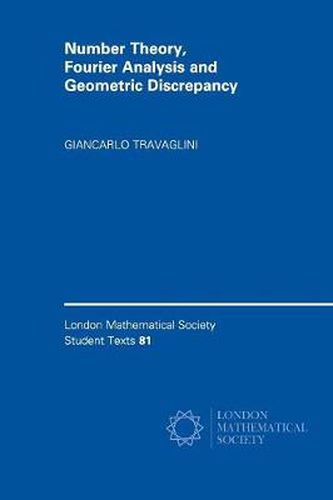Readings Newsletter
Become a Readings Member to make your shopping experience even easier.
Sign in or sign up for free!
You’re not far away from qualifying for FREE standard shipping within Australia
You’ve qualified for FREE standard shipping within Australia
The cart is loading…






The study of geometric discrepancy, which provides a framework for quantifying the quality of a distribution of a finite set of points, has experienced significant growth in recent decades. This book provides a self-contained course in number theory, Fourier analysis and geometric discrepancy theory, and the relations between them, at the advanced undergraduate or beginning graduate level. It starts as a traditional course in elementary number theory, and introduces the reader to subsequent material on uniform distribution of infinite sequences, and discrepancy of finite sequences. Both modern and classical aspects of the theory are discussed, such as Weyl’s criterion, Benford’s law, the Koksma-Hlawka inequality, lattice point problems, and irregularities of distribution for convex bodies. Fourier analysis also features prominently, for which the theory is developed in parallel, including topics such as convergence of Fourier series, one-sided trigonometric approximation, the Poisson summation formula, exponential sums, decay of Fourier transforms, and Bessel functions.
$9.00 standard shipping within Australia
FREE standard shipping within Australia for orders over $100.00
Express & International shipping calculated at checkout
The study of geometric discrepancy, which provides a framework for quantifying the quality of a distribution of a finite set of points, has experienced significant growth in recent decades. This book provides a self-contained course in number theory, Fourier analysis and geometric discrepancy theory, and the relations between them, at the advanced undergraduate or beginning graduate level. It starts as a traditional course in elementary number theory, and introduces the reader to subsequent material on uniform distribution of infinite sequences, and discrepancy of finite sequences. Both modern and classical aspects of the theory are discussed, such as Weyl’s criterion, Benford’s law, the Koksma-Hlawka inequality, lattice point problems, and irregularities of distribution for convex bodies. Fourier analysis also features prominently, for which the theory is developed in parallel, including topics such as convergence of Fourier series, one-sided trigonometric approximation, the Poisson summation formula, exponential sums, decay of Fourier transforms, and Bessel functions.